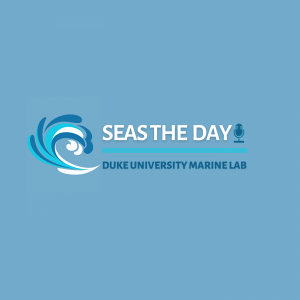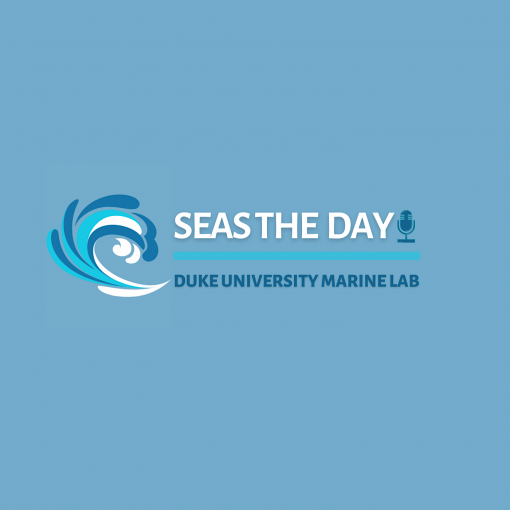On this episode Bree Collins and Erin Sullivan speak with Dr. Andy Read and Dr. Randy Wells about their past, present, and future efforts to save the critically endangered vaquita.
Listen Now
Episode Hosts
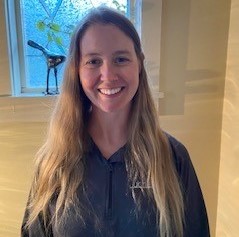
Erin Sullivan holds a master’s degree in environmental policy and natural resource management from the University of Denver and took Summer coursework at the Duke Marine Lab in 2020. She plans to apply for a Ph.D. in marine science and conservation.
Instagram: Erinsullivan405
Bree Collins
Interviewees
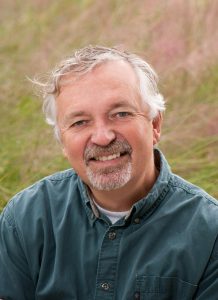
Andrew J. Read, Stephen A. Toth Distinguished Professor of Marine Biology in the Nicholas School of the Environment
Dr. Read’s research interests are in the conservation biology of long-lived marine vertebrates, particularly marine mammals, seabirds and sea turtles. Much of his current research documents the effects of human activities on populations of these species and attempts to find solutions to such conflicts. This work involves field work, experimentation and modeling. He is particularly interested in the development and application of new conservation tools.
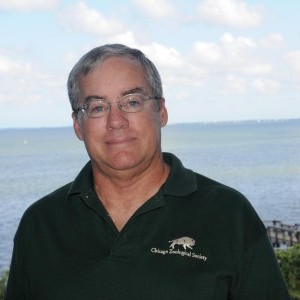
Randall Wells, Ph.D.
Dr. Wells is employed by the Chicago Zoological Society and based at Mote Marine Laboratory as the Director of the Sarasota Dolphin Research Program, “the world’s longest-running study of a dolphin population.” This study, initiated at Mote in 1970 and continued through a partnership involving Mote, CZS, and collaborators from around the world, examines the biology, behavior, ecology, health, and human impacts on dolphin populations in Florida and elsewhere, and engages in conservation research training, education, and mitigation activities.
Series Host
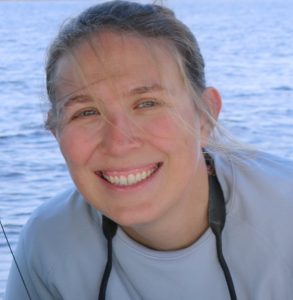
Dr. Reny Tyson Moore host the Whale Pod series. She is a broadly trained interdisciplinary behavioral ecologist with expertise in marine mammal bioacoustics, photographic-identification, population biology, and bio-logging tools and techniques. She is currently a staff scientist with Chicago Zoological Society’s Sarasota Dolphin Research Program and a contractor for NOAA Fisheries Office of Protected Resources through Ocean Associates Inc. Reny received her PhD from Duke University in Marine Science and Conservation, where she used high-resolution acoustic and movement tags to study the fine-scale foraging behaviors of humpback whales along the Antarctic Western Peninsula. Before this, Reny obtained her BSc and MSc from Florida State University where she examined nonlinearites in cetacean vocalizations and determined the abundance and community structure of bottlenose dolphins in the Big Bend of Florida. She went on to apply her skills as a Postdoctoral Research Fellow and Scientific Committee of Antarctic Science Fellow at the Institute for Marine and Antarctic Science, based at the University of Tasmania in Hobart, Australia, and then as a postdoctoral scientist with the Chicago Zoological Society’s Sarasota Dolphin Research Program. Reny has published or been a co-author on many peer- reviewed scientific articles, technical reports, conference papers, children’s books, and conference and workshop presentations. She also serves as a mentor and teacher for undergraduate and graduate students at various institutions, including the Duke University Marine Lab.
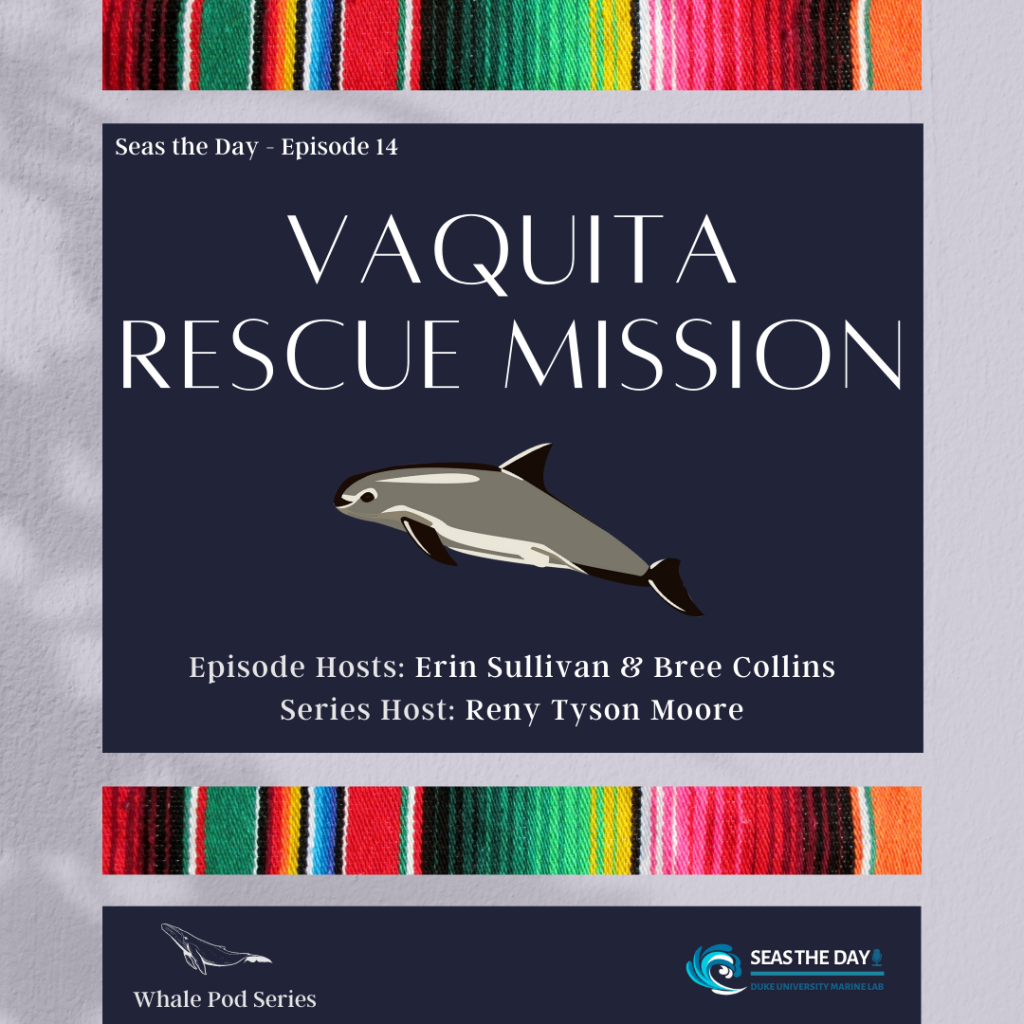
Supplemental material for this episode
“Oyster Waltz” by Joe Morton plays
Reny Tyson Moore: Hello! Welcome back to Seas the Day, and our next installment of the Whale Pod Series. Today, Duke students Erin Sulivan and Bree Collins speak with Drs. Randall Wells and Andrew Read about the vaquita – the world’s most endangered marine mammal – and their efforts in vaquita research and conservation. With as few as 10 individual vaquitas left, the vaquita is faced with a real and present threat of extinction if measures are not immediately put into place to protect them. In today’s episode, you will learn about the complexities behind the vaquitas story and how at the heart of things, their story is truly one about people…. and it’s people that must step up, act, and share the vaquita’s story now so that it is not repeated. And with that, I will let Bree and Erin take it away..
Sullivan: Hi everyone! I’m Erin Sullivan and I’m here with my colleague, Bri Collins. Today we will be speaking with Dr. Randy Wells, the director of the Chicago Zoological Society’s dolphin research program in Sarasota, Florida, and Dr. Andrew Read, the Stephen A. Toth Professor of Marine Biology and director of the Duke University marine laboratory. Both Randy and Andy have been involved with vaquita research and rescue efforts for the last several decades. the vaquita, phocoena sinus, is the world’s smallest cetacean and most endangered marine mammal. The vaquita’s story is a sad and complex one. Like many marine mammals, the vaquita has been severely affected by the actions of humans. There are a handful of harmful actions people have undertaken in recent history, but gillnet bycatch has been incomparably devastating to the vaquita population.
Bree: The totoaba is a critically endangered fish that inhabits the same waters as the vaquita in the Gulf of California. Its swim bladder has become very valuable for alleged medicinal purposes, although there’s no evidence to support it. There is intense profit to be made in the black market for totoaba swim bladders, and while some steps have been taken to limit gillnet fishing in the Gulf of California, the monetary gain of continuing to catch totoaba with gillnets has motivated cartels to get involved. Now a complicated dynamic has emerged in which local fishermen are being hurt by fishing restrictions, the cartels are paying extraordinary amounts of money to these fishermen to defy the restrictions, and local authorities are not enforcing the restrictions to the extent they should be. As a result the vaquita population continues to dwindle.
Erin: In the last couple of years there have been increased efforts to protect the remaining vaquitas. Sea Shepherd, an international non-profit revolving around protecting marine mammals, has begun patrolling the areas and removing any gillnets they can find. “Vaquita CPR” was an emergency effort in 2017 to remove the surviving vaquitas from their gillnet-infested habitat until measures were taken to ensure the animals’ safety. Both Dr. Wells and Dr. Read were active in organizing the event. However, it ultimately was suspended as it was deemed too risky to the already very scarce survivors.
Bree: Hi Dr. Wells. As Erin just said, said you have been an active contributor to vaquita conservation efforts in recent years. How did you get involved in this story?
Wells: The issue of the vaquita is something that’s been a part of my life for much of the time that I’ve been involved in the field: My first research project with my major professor for my Ph.D., Ken Norris, was to go to the Gulf of California and try to find the vaquita. He had first described the vaquita for science in 1958 and even at that time it was not something that was commonly reported by fishermen or others on the water down that area, so he wanted to get a sense of what it was like. So we went down and did a survey in the late 70’s and found very few… very few vaquita even though we surveyed about 2000 kilometers of the upper Gulf of California. We saw a lot of other animals, but not those. So over the years there’s been other indications, even in the 90’s of problems with vaquita population numbers, and that was as a result of a variety of fisheries at the time: There have been gillnets for a lot of things, including sharks, down there over time, but over the years the totoaba became more than just a food fish for the local Mexican population.
Erin: By that you mean the observed value of its swim bladder made it worth catching for more than just sustenance. Can you elaborate on that, Dr. Read?
Read: Yep. It’s called “buche” in Mexico and uh, the story behind the totoaba bladder is that it’s a… it’s a substitute for the bladder… um, and so there was a fish called the bahaba in China which is a close relative to the totoaba. And the bahaba bladders were valued just the way, the same way that totoaba bladders are valued. The bahaba is now functionally extinct. It was fished out because of the bladders. And it’s a big, gorgeous fish. I mean they’re, you know, four or five feet long, they’re beautiful and really tasty, but they value now is in the bladders which are caught illegally, the rest of the fish is discarded, the bladder is dried and then smuggled to China. And it’s so valuable now, I mean it used to have its value, supposedly is in folk medicines to cure cancer. But they are so valuable now they’re held onto like gold is. So if… if I had a totoaba bladder in China, I would hold on to it because it’s gonna get more and more valuable. Or if I really wanted to influence somebody in a business transaction, I might give him a totoaba bladder as a bribe or as a gesture of how much I appreciated the opportunity to do business with you.
Erin: Is there a way to make them not so valuable?
Wells: Yeah, so we’ve talked… we’ve thought through a lot of ways to do that. Um… one, you could try and flood the market with fake bladders. The buyers are very good at differentiating bladders. It’s… because it’s in their business interest to do that. Um… we’ve talked about, and the government of Mexico has talked about trying to legalize the trade in totoaba bladders. Same thing as the ivory, um, trade, right? The problem there is… so you had a legal fishery for totoaba that didn’t involve these big mesh gillnets that caught vaquita. you can catch totoaba on hook-and-line, on long lines, different types of gear that don’t pose a threat to the vaquita, so say you did that and every totoaba bladder that was caught legally was marked somehow, you know, it’s tagged, it’s… sustainable, you know, it’s vaquita-safe totoaba bladder. Because the easiest way and the most efficient way to catch totoaba is these big mesh gillnets that the fishermen just put in the water and leave and killed vaquitas, and because there’s so much corruption in the upper Gulf, it would be impossible to differentiate the legal bladders from the illegal bladders. You know, like you wouldn’t be able to control it. And so… we just don’t think that that’s, you know, if we were 25 years ago maybe we could have done something like that. But the situation is so bad now that it’s… you’d never be able to control it. Same problem with elephant ivory, it’s exactly the same problem. Trying to have a legalized trade in elephant ivory becomes almost impossible.
Bree: Uh, Randy, in 1981 you participated in a survey of marine mammal abundances named “A Survey of the Marine Mammals of the Upper Gulf of California, Mexico, with an Assessment of the Status of phocoena sinus” with Bernd Würsig and Ken Norris for the US Marine Mammal Commission. Um, the report basically says most populations look abundant enough, but I was quite taken aback when I read, um, something along the lines of “vaquita numbers have been suspected to be decreasing,” the key word there being “suspected,” because forty years later we’re in the situation that we are now. Um… I was just wondering, what sort of thoughts were going through your mind in 1981 when you thought that maybe the vaquitas were at risk. Did you see this coming?
Wells: Well, people had been raising the flag about there being issues with these animals for quite some time. They’re not in US waters so it’s not subject to US protection measures directly, although the US has gotten involved at the request of Mexico, with the permission of Mexico. But it was really a situation that was, uh, a Mexican conservation issue, and there were people down there who had been trying to make people aware of the issue for quite some time. And the declines, as I said, were from other kinds of fisheries as well. The vaquita is a small enough animal that many of the fishing nets that are out there can catch it fairly readily. And even when we were doing our surveys in the Gulf California back in… in the late 70’s, we did beach walks as well. We would see nets that were stretched out perpendicular to the beach, presumably for shark fishing, and on each side of the net there’d be carcasses in various states of decomposition of a variety of different kinds of animals. We didn’t find anything that we identified as a vaquita, but they were common dolphins or bottlenose dolphins or sea Lions that had become entangled in those nets. So it was a dangerous place for marine mammals even back in the 70’s. But given how hard it is to see vaquitas in the wild because they are so tiny and elusive, I think that people really had a hard time recognizing how dire the situation was. And so was it a series of surveys that were done in the mid-2000s and… 2010s ten or… 2015 was the main survey that showed that the numbers were really small. That something dire needed to be done.
Bree: And by “something dire” you mean the vaquita CPR rescue effort? For those of you listening who are less familiar with the subject, ex situ efforts at conservation or efforts done completely off-site, like in the case of the vaquita, the Gulf of California is not going to be…come a hospitable environment for the species anytime soon. Thus, the species’ only chance might be in an isolated facility. There was a collective effort to remove vaquitas from the Gulf of California, and we’ll talk more on that later I’m sure, but it was called “vaquita CPR.” And, Randy, these efforts require serious, very serious consideration, right? Could you speak a bit on that and how it impacted vaquita CPR?
Wells: The decision to bring the animals into a captive situation was not taken lightly…
Bree: Yeah.
Wells: And it was probably done too late. Usually if you’re considering an ex-situ conservation option, you already know that it’s a viable option for your animals. You’ve had some experience with the animals to know that you can take care of them under human care, that you know how to… maintain them and potentially get them to breed before you ever enter into a large-scale operation to try to bring more animals in. And this project suffered from not having that background information. No one had ever maintained these animals under human care before.
Bree: Yeah, so, knowing all the risks in play with such little familiarity with the vaquita in ex situ efforts… what sort of conversations were happening? Was it just that “this is our last hope, this is the only option that we have and so we have to try it?”
Wells: Most of the people that we interacted with were of that mind, that this was a last-ditch attempt. That if we didn’t do this, they were all going to be wiped out by the fisheries. There were certainly those who critiqued the idea and said “Oh no, it’s better off if they just die in their natural environment.” And you get all kinds of opinions. That’s just the way of the world. But it was the considered decision of the CIRVA, of the…the commission that was directing Mexican management of these animals, that a capture effort should be made. And they requested our efforts to come down there and work with them in order to conduct these activities. So it was… it was a Mexican operation from the start and through the finish. We were working with them and helping them to the best of our ability.
Read: At that time people said “OK this is a really bad idea, but it’s the only idea we have now, ’cause otherwise the species is gonna go extinct.” So I mean I kind of think about it, it’s like, you know, I always use bad baseball analogies, but it was the bottom of the ninth, there were two outs, you know, and you’re on your last strike, and you’re facing the best pitcher in the world. And it’s like, you know, the chances are pretty small. But we did, we assembled the best possible team we could, we gave it a really good shot, and it didn’t work. I think, I really believe in my heart that if we had tried this in 1997, that we would not have been deterred by the mortality of the female, and I think we could have found ways to keep captured vaquitas alive. We had a pretty robust but very professional debate between the biologists on the CPR team and the veterinarians as to what to do when we captured an animal. The veterinarians really wanted to sedate the animals to calm them down, to use valium, because porpoises can be very high… high-strung. I’ve captured a lot of porpoises out of fishing gear, and what we do, what the biologists typically do to try and get… to handle them as little as possible, get them back in the water as quickly as possible. And the veterinarians wanted to hold them longer and to sedate them and to… to treat them chemically. I think in… in hindsight that was an error, but, um, you know, nobody had ever caught a vaquita before so we didn’t know. But I think if we had a chance… if we had another chance to do it, um, we might have found ways that we could handle animals and get them back into a large pen and not have them die. Maybe. We’ll never know.
Sullivan: I read the 2017 paper by Len Thomas and collaborators called “Last Call: Passive Acoustic Monitoring Shows Continued Rapid Decline of Critically Endangered Vaquita.” It was published in The Journal of the Acoustical Society of America and… mostly discussed passive acoustic monitoring as a way to track vaquitas through echolocation clicks, and the results show an overall decline in the acoustic detection rate. Can you give us an update on what is happening with vaquitas right now?
Wells: Yeah, good question. So we don’t really know, to be honest. Usually in the summer we conduct an acoustic monitoring program, so we put out anywhere between 45 and 75 C-PODs, these echolocation clicks detectors, and we, we moor them in the core of the vaquitas’ range in the upper Gulf of California and we use the number of clicks we detect on those… on that array of C-PODs to give us an index of abundance. And over time we’ve seen the numbers come down and down and down and down and down, um. So we haven’t… the C-PODs are out now, we don’t have them back yet. Um… the situation in the upper Gulf is not being good. There’s a lot of COVID now and there’s… cartels are very active, so it’s not a very good place to be working. So we can’t tell you how many animals are left, if any are left. We saw three calves in the fall which is a good sign. Two or probably three, one of them might have been a re-sight, but we think three calves. So the animals that were still around in the fall are still healthy. They’re reproducing, they’re, you know, they’re doing well. Um, there are efforts in play to try and do something before the next totoaba season starts, which will be in October, November. So we’ll… we’ll see whether it’s going to be possible to do anything before that. But yeah, if I had to guess, I would say there are probably, if we are lucky, maybe a dozen animals left.
Erin: So that’s down from even last year, right?
Wells: Yeah we… we found at least one carcass last totoaba season, an adult female, which is very sad. Um… it, you know, when you get to really tiny populations like this it’s really hard to be precise about how to… how many animals are left unless you have a very distinctive, easy to monitor population. And these guys are not. They’re very… we call them kind of the “ghost porpoises,” they’re really hard to see. They’re… you need perfect conditions and to be lucky to see them, so it’s hard. Which is why, one of the reasons we use the acoustic monitoring because they’re very vocal, they produce really distinctive sounds at about 132 KH, nothing else produces sounds at… those frequencies, so we use the acoustics to monitor them pretty well.
Erin: That is really sad about the loss of the female. Vaquitas reach sexual maturity at about three to six years into their lives, so the reproductive-age female’s death in the population as small as a dozen animals seriously limits the growth of the population in the next several years.
Bree: And have we learned anything since about why the vaquita is in particular so vulnerable to gillnet fishing?
Wells: Fishing effort with nets that are designed to catch fish about the same size as the vaquita is a big issue. A totoaba, a full-grown totoaba with the more valuable swimbladders is about the same size as a full grown vaquita. And so nets that will catch that will catch the vaquita as well. It’s really the increase in the illegal fishing that is… that is bringing about the demise of the animals, and no control over the fishing efforts down there.
Read: One of the ways we’ve mitigated that problem in the US is to put little sound emitters on gillnets, little pingers. And because porpoises are neophobic they tend to stay away from the sound of the pingers, and so they don’t get tangled up in the nets.
Erin: “Neophobic” meaning they dislike new and unfamiliar things?
Read: Um, the problem is so dire in the upper Gulf now. There’s so many illegal nets set. And the way that the poachers do it is they take out… they make these nets and they take them out and they set them on the bottom, and they’re really big mesh nets which are good at catching everything. They don’t mark them with surface buoys, because if they do the Sea Shepherd would come along and pull ‘em up. And so they’re just littering the bottom with these things. They mark them with a GPS and they go grapple them, grapple them to pull them up. Then they put them straight back down again. Um, but they never take those nets in. And so the whole place is just littered, it’s just this maze of nets. Um, and so the chances are that even the really smart, older female vaquitas which are good survivors, you know, eventually they’re going to make a mistake and get caught in the net. But to your question about why porpoises get caught so frequently in gillnets, we don’t really understand. They should be able to detect parts of the net and so it may be that they’re not paying attention when they’re foraging, it may be… I think the older females, that are pretty savvy, know what a net is. Probably young porpoises don’t, and so we see pretty high mortality rates of juvenile animals that just don’t know what a net is, get caught, and then they’re dead.
Erin: Andy, you sent me a paper that was just published a couple of weeks ago in July 2020 called “Vaquitas continue to die from bycatch, not pollutants” by Frances Gulland et al. This was published in the journal Veterinary Record and concluded that bycatch is really the definitive cause of Vaquita mortality.
Read: Yeah, there’s no question. The reason that those papers get produced is because there are still people in Mexico who for either political reasons or because they’re kind of associated with the cartels want to muddy the waters by saying it’s either “the animals are dying as a result of pollution” or “they’re dying as a result of diversion of fresh water from the Colorado River” and we see no evidence of that at all. It’s a pretty clear cause and result. You know, the animals get killed in gillnets in the upper Gulf right now. So yeah it’s, it’s… the politics in Mexico are very strange and it’s hard to know sometimes kind of who you’re talking to, but we’ve had people from the fisheries ministry who have told us, you know, the vaquitas don’t exist, the vaquitas are, you know, some figment of gringos’ imagination, or vaquitas are just being used to screw Mexican fishermen. But, you know, it’s pretty clear that the vaquita, when it goes extinct, if it does go extinct, they’re going to go extinct because of mortality and illegal gillnets.
Bree: And a similar token, because it’s become pretty clear that illegal gillnet fishing isn’t slowing at all, do you think that maybe with the awareness efforts like the “Sea of Shadows” documentary that we’ve been going for are targeting the wrong populations insofar as most of the totoaba black market trade is not occurring in America?
Wells: Right, it’s in China. And it’s the market and there are efforts underway to try to limit the market over there but it’s all illegal and it’s all black market and it’s a very difficult thing to try to interfere with by its very nature. It’s hiding from the public and hiding from law enforcement.
Bree: And do you think there’s a chance of increasing awareness efforts in those areas? I guess it’s difficult to convince someone that there’s no medicinal benefits of the swim bladders, but maybe highlighting the cost of what is happening in an attempt to appeal to human empathy? Is the decimation of vaquitas a widespread understanding or is it mainly localized to America?
Wells: My understanding is that there are efforts to increase awareness about the issues but that it is a very, very strong market, it’s one that involves a great deal of money changing hands, and those who want to pursue it are going to pursue it. it’s the same market that deals with rhino horns and other pieces of endangered species. All the increased awareness in the world has not made a difference in terms of those parties that really want to do this from doing it. So it really takes, I think more than anything else, very publicized law enforcement crackdowns and scaring the people that are making their living off of this into not doing it anymore, is probably the only thing… well, it’s a combination of things. Increased awareness has to continue to happen, it has to increase over time with new generations, um, but along with that there needs to be the very strong message out there that this sort of behavior of these activities are not going to be tolerated, that there is no room for it and that there is no money to be made from it, there is no opportunity to make your living from that and have a good life.
Bree: Are you disappointed with how it’s been enforced in Mexico?
Wells: Oh, absolutely. Yeah, I don’t know of anyone who isn’t. If enforcement had been put in place in a reasonable way decades ago or even a decade ago we wouldn’t be where we are right now. But it just has not happened. And it’s a very difficult place to do this sort of thing. It’s in the middle of the desert, there is very little alternative work for the fishermen who are there and the efforts to try to create alternative fisheries have had mixed success down there. So there are sociological factors that need to be taken into consideration and dealt with for the existing population of fishermen to de-incentivize them. But when you’ve got the drug cartels that are providing them with the funds to replace their nets if they’re taken, and paying them more in a day than they could have made in a year fishing for fish, it’s a really difficult situation for these folks.
Erin: I think in “Sea of Shadows” something that really stood out to me was people had signs saying “we’re starving and they’re saving the vaquitas” and it’s just hard to think “how can we help vaquitas and people?”
Read: Right. that’s the win-win that we all look for, right? So some of the things we’re talking about now are trying to hire Mexican fishermen to serve as guards in a, you know, a more tightly controlled protected area. But it’s a terribly mismanaged system and even all the money that went into supposedly paying fishermen not to fish, a lot of that money was diverted by the cooperatives and went to the wrong people, so… and the fishermen there, you know, you saw in the movie, I mean some friends of ours whose families chose not to poach, you know, it’s a really difficult decision for them ’cause they’re not…. you know, the people living next door to them are buying new trucks, sending their kids to school, are making tons of money, never gonna get caught, if they do get caught they’re never gonna get prosecuted, and so the people who try to do the right thing just get punished and that’s… that’s hard.
Bree: Yeah, um, when they banned gillnet fisheries altogether they were trying to compensate but how can you compensate for people who are making like hundreds of thousands of dollars a day from swim bladders? Um, so did you have, after vaquita CPR was suspended when those two capture attempts didn’t go well, did you still have hope after or was that sort of it for you?
Wells: We didn’t have any hope for that particular approach that time, and just to be clear we were the ones who chose to suspend it. We were not told…
Bree: Yes.
Wells: We did that on our own recognizing that the population just can’t handle that level of additional loss. Um this was… just to put the project into perspective, the approval for the project came about, I believe, in late November, early December of 2016. There wasn’t the 1st dollar towards doing a $5,000,000-plus project on January 1st. So to be out in the field catching vaquitas by the middle of October required raising $5,000,000, lining up the vessels, lining up the experienced personnel to staff those vessels for doing the searches for the vaquitas, for operating the hydrophone array that would help to bring us to where the animals were, for putting together an international capture team for getting the nets made, for building the facilities on shore for animal care and for emergency medical situations, for putting together and bringing around the Peninsula the sea pen that was going to serve as the facility for holding these animals, that came from Ensenada and had to go 3,000 kilometers during hurricane season being towed behind a tugboat. All these things had to come together before October to make the project happen, and the fact that it did is a pretty amazing testimony to the dedication of the people that were involved. And we did this in spite of the fact that the Mexican government kept delaying providing their $3,000,000 out of… for the budget. We didn’t get that till April. And so a lot of this was done out of the goodwill of people. It was done largely through the support of donors and especially through the AZA the American Association of Zoological… uh, of Zoological parks, who got… who brought in membership funds to make this work happen. It was a huge effort that was mounted, and we went into this knowing that it was very high risk, not wanting to do it in the first place, not wanting to have to do this, but knowing that there really wasn’t any other choice but to at least try it. But we went into it not knowing if we were going to be able to find vaquitas. They’re very tiny, there weren’t very many left, the estimate at the time was that there were fewer than 30 left in the entire upper Gulf of California, which is a pretty big body of open water. We didn’t know, if we found them, if we would be able to catch them. No one had ever specifically tried to catch them to keep them alive. We didn’t know, if we caught them, if we’d be able to transport them to a facility, if they would survive the transport. We didn’t know, if we got them to the facility, whether or not they would be able to adapt to life within a facility and whether it’d be able to be taken care. There were a whole lot of unknowns that we went into this with, and at each level the risk is high.
Erin: Well, to go back to your baseball metaphor, so if it’s in the bottom of the ninth, there are two outs, you have to swing right?
Read: Right, right. And so we swung, and we don’t… I don’t feel bad about swinging, you know? I mean, you had to do it. And we had the best possible team. Um, I was a little concerned when we first went down there because it’s like you… we took we hand-picked all the best marine mammal veterinarians, all the best porpoise biologists, all the best trainers who had experience with porpoises from all over the world, and all those people are used to running their own programs. Like I am, right? And then all of a sudden, you know, there are 50 of us or 60 of us there, and we all have to get along and not… and tuck our egos aside, and it worked remarkably there was no absolutely… just no bull%$&@ whatsoever. Everybody just… you know, even if there’s something menial that needed to be done, people just did it. It was really remarkable to see that. That everybody put all that stuff aside to try and do this thing, this crazy thing, that none of us really, I think, in our hearts thought we were going to be successful, but we felt like we had to swing.
Erin: So, from 1996 till 2020, there were about 500 then, there… maybe you think 10 or fewer now?
Read: Right.
Erin: What do you think, in 2050, what does that look like for vaquitas?
Read: Um, probably 0. Probably 0. I mean the good, the… the, on the, on the positive side if we could stop the mortality, meaning stop it, not reduce, but stop it, the species shows every sign of being able to bounce back. now we worry about things like lack of genetic diversity but we’ve got other good examples of marine mammals that have bounced back. We think maybe at one time there were 20 Northern elephant seals and now we’ve got, you know, hundreds and thousands of them. And, uh, vaquitas have bottlenecked before, so they’ve survived a long time without any genetic diversity. So if we could just get through, just a couple of years now, and stop the mortality and get the illegal fishing under control, then they’d have a chance. But yeah, that’s… maybe more of a fantasy than reality. Likelihood is that they’ll go extinct soon.
Bree: And lastly I’d like to touch on Randy’s paper in 2019 with Barbara Taylor et al. It’s titled “Likely annual calving in the vaquita Phocoena sinus: A new hope,” and it was published in Marine Mammal Science. So a young vaquita that was captured during Vaquita CPR… I think it was believed that she was less than a year old, and now it’s believed according to this paper that the mother of that calf was then photo ID’d a year later with a new calf, correct?
Wells: Right.
Bree: So does that give you any sort of hope that maybe, if they are calving annually, that there could be a comeback?
Wells: You know, they’re two items of hope there but I don’t want to put too much emphasis on them because the population is so, so, so low. But the idea that their reproductive rate is perhaps twice what we thought it was, which is a reasonable density-dependent response, suggests that they… if they’re left alone, and that’s the big “if,” they could recover. The other thing that we saw was that many of the animals that we saw out there and photographed and the ones we handled had indications of apparently having been entangled at some point before. So not every entanglement is necessarily a mortality, and some of the more experienced females may have the ability to avoid nets, may have learned that. And so there may, and it’s a big may, but there might be a segment of the population out there that could carry things on. But given the dramatic increase in the number of fishing boats out there it’s hard to imagine that every vaquita is not gonna be susceptible to being caught in their nets. So that’s not very helpful, is it?
Bree: No, that’s not very helpful.
Wells: It’s a horrible, horrible, horrible situation that humans let get to that point.
Bree: On behalf of both Erin and I, I’d really just like to thank Dr. Wells and Dr. Reed for making the time in their very busy schedules to come out and have these conversations with us. And I’d also like to make sure that we don’t leave on such a devastating note because… so while the reality is that the vaquita’s situation is not a hopeful one, we have certainly taken away, um, something from it. And insofar as I know for sure that Dr. Wells is working on this in this group that is advising international conservation groups, basically consulting them on when we have these small cetacean populations at risk, but not critically at risk like the vaquita is now, then maybe we should start considering rescue efforts ahead of time so that 10 years down the road when right now we have 500 individuals but we only have 20 at the end, we know exactly how to undergo these operations that could save many populations while the time is available to do all the research necessary to ensure success of the projects and I’d also like to thank all of our listeners today and our music is royalty-free by Kevin Mcloyd of aboveincompetech.com
“Oyster Waltz” by Joe Morton plays
Reny Tyson Moore: Thanks Bree and Erin for such an in-depth overview on the story of the vaquita. I also want to thank Drs. Randy Wells and Andy Read for sharing with us all their heartfelt stories and for all of their hard work trying to save this vulnerable species. Today’s episode was written and produced by Erin Sulivan and Bree Collins and was edited by Brandon Gertz. All opinions and views expressed during the episode are of the speakers and do not represent Duke, the Chicago Zoological Society’s Sarasota Dolphin Research Program, or any other party. If you want to learn more about this week’s episode or other series episodes, please check out our website at sites.nicholas.duke.edu/seastheday. You can also check us out on Twitter and Instagram at SeasTheDayPod. Our theme music was written and recorded by Joe Morton. Our artwork is by Stephanie Hillsgrove. Jeff Priddy provides us with technical support. Join in next time, during our last installment of this Whale Pod Series. Thanks for listening!
Gulland F., K. Danil, J. Bolton, G. Ylitalo, R.S. Okrucky, F. Rebolledo, C. Alexander-Beloch, R.L. Brownell, S. Mesnick, K. Lefebvre, C.R. Smith, P.O. Thomas, and L. Rojas-Bracho. 2020. “Vaquitas (Phocoena sinus) continue to die from bycatch, not pollutants.” Vet Rec. 187(7):e51. doi: 10.1136/vr.105949. Epub 2020 Jul 13. PMID: 32661184; PMCID: PMC7591798.
National Geographic Documentary Films. “Sea of Shadows: The Cartels, the Black Market and the Fight to Save a Species.” 2019.
Taylor, Barbara L., Randall S. Wells, Paula A. Olson, Robert L. Brownell, Frances M. D. Gulland, Andrew J. Read, Francisco J. Valverde‐Esparza, et al. 2019. “Likely Annual Calving in the Vaquita, Phocoena sinus: A New Hope?” Marine Mammal Science 35 (4): 1603–12. https://doi.org/10.1111/mms.12595.
Thomas L., A. Jaramillo-Legorreta, G. Cardenas-Hinojosa, E. Nieto-Garcia, L. Rojas-Bracho, J.M. Ver Hoef, J. Moore, B. Taylor, J. Barlow, and N. Tregenza. 2017. “Last call: Passive acoustic monitoring shows continued rapid decline of critically endangered vaquita.” J Acoust Soc Am. 142(5):EL512. doi: 10.1121/1.5011673. PMID: 29195434.
Wells, R.S., B. Würsig and K.S. Norris. “A survey of the marine mammals of the upper gulf of California, Mexico, with an assessment of the status of Phocoena sinus.” 1981. Unpublished report to the U.S. Marine Mammal Commission.

